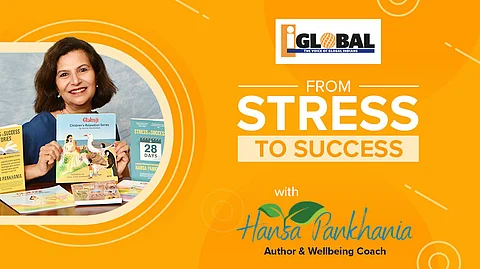

I wanted to share some insights from my book ‘Stress to Success in 28 Days – A unique programme for total wellbeing’ as a formula for both individual and corporate success!
The tools in this book can be easily assimilated into hectic everyday routines to help you maintain a calm, productive and fulfilling life, both inside and outside of work. The book is relevant for individuals, managers and corporations. It provides exclusive guidance on how to integrate simple changes and practices that do not cost anything but can easily be incorporated into a high-pressure busy routine. It highlights how these techniques enable powerful benefits of diminishing stress, promoting good mental health and hence effectiveness and productivity overall.
Inspiration for the book
I was inspired to write this book to fulfil my passion of reaching out to a wider audience. I wanted to pass on easy simple techniques that diminish stress, enhance health and increase happiness in powerful ways. I borrow strategies from her Western academic study and research, as well as her Eastern upbringing, which make this book stand out in the health/business genre.
I have pulled together a number of significant techniques spanning her 25-year career and skilfully presents these in the format of a four-week programme that individuals can easily follow. The programme can equally be modified into a cohesive corporate intervention to enhance productivity, foster a healthy work culture and help to:
● Discover cost-free, powerful, natural coping techniques
● Integrate simple wellbeing exercises to complete at work or at home
● Enrich communication and relationships
● Propel resilience and a sense of relaxation
● Boost creativity and productivity
● Ignite energy, creativity and happiness.
MORE LIKE THIS…
Market potential
The book has potential in commercial corporate settings, due to the high media profile on mental health and government initiatives to tackle stress and mental health issues in education and work settings, following the pandemic and high-profile individuals sharing their struggles with mental health.
The programme in the book is covered over six chapters and 26,000 words, making it a light, easy read for the target audience, who potentially may have busy schedules.
Chapter One helps the reader to explore and understand the concept of stress and measure stress levels using questionnaires. In addition, the first chapter inspires the reader to prepare and take the first step on to the programme.
Chapter Two discusses the use of the breath and related techniques to reduce stress. It introduces both simple and complex methods of achieving this.
Chapter Three focuses on the physical body discussing interventions in the home, during the daily commute and at work that keep the body stress free and healthy.
Chapter Four focuses on the human mind. The author uses interesting metaphors to engage the reader to the complexities of the stressed overactive mind, helping the reader to achieve clarity through the practices to optimise the mind potential.
Chapter Five explores relationship styles and patterns, both at work and home, that impact on stress and interesting ways of addressing these.
Finally, Chapter Six provides a sound empirical base to the ideas and interventions presented by citing household corporates such as Google, which have introduced similar wellbeing programmes into their structures.
Each chapter is supported by a useful summary and illustrations to simplify the process of that week’s practice.
MORE LIKE THIS…
Hansa Pankhania is an acclaimed author and renowned coach and speaker on wellbeing, stress prevention and resilience. In this exclusive column, she will be presenting cost-free, simple, natural coping tips that can be integrated in a busy routine at home and at work to sustain a stress-free, joyful and successful life.